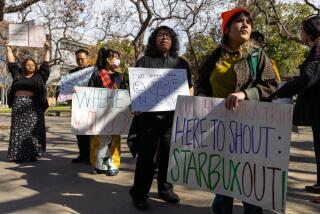Black Activists Press for Continued Boycott of Texaco
- Share via
The Rev. Jesse Jackson and the Los Angeles chapter of a black political organization continued to call Saturday for a boycott of Texaco Inc., despite settlement of a race discrimination lawsuit against the giant oil company.
“This is one of those special moments we must seize,” Jackson said at a rally of about 30 people outside Texaco’s Wilmington refinery.
While Jackson called Friday’s settlement a good step, he said it was important to maintain pressure on Texaco to extend minority outreach in the form of jobs and contracts, and to reduce air pollution at its refinery operations and improve safety.
“The boycott will continue until Texaco comes to the table and focuses on two other areas--environmental justice and economic development,” said Jackson, who earlier in the day made similar remarks in Chicago.
The Wilmington protest was one of a few held across the country Saturday by civil rights groups.
The settlement diffused some of the demonstrations, but activists insisted that Texaco do more to eliminate the racial hostility evident in secretly recorded conversations of top company executives.
“We feel it was a historic agreement,” the Rev. Al Sharpton said of the settlement, as he led about two dozen sign-waving demonstrators at a Texaco station in Brooklyn. “But now we must deal with corporate structure, board makeup, contracting, advertising and franchises.
“We have won the first game of the World Series, but the series is not over,” Sharpton said.
Texaco spokeswoman Barbara Kornylo said Saturday that the company is “committed to developing and enacting specific and effective policies to make sure we wipe out discrimination.”
Those policies will include initiatives to increase contracting with minorities as well as the number of minority-owned Texaco stations, Kornylo said.
Texaco reached the settlement amid a national uproar over the 2-year-old tape-recording, disclosed this month in court documents. On the tape, corporate officials can be heard disparaging African Americans and discussing destruction of incriminating evidence in the lawsuit.
The agreement, valued by plaintiffs’ lawyers at $176 million, calls for Texaco to pay an immediate $115 million in damages and grant pay raises of at least 10% to about 1,400 black employees. The company also consented to form a task force to give the lawsuit plaintiffs a say in hiring and promotion policies.
Saturday morning, about 20 picketers from the Los Angeles chapter of the Black American Political Assn. of California briefly demonstrated in front of an Inglewood Texaco station.
Chanting “Money is not the answer,” and holding “Boycott Texaco” signs, they demanded that Texaco take a number of steps beyond the settlement.
“$176 million is nice, but it’s not enough,” said Glen Brown, acting chapter chairman, whose group picketed a Los Angeles station the week before. “We’re very concerned about curing this culture of cancer, of racism. . . . Just because you take one piece out doesn’t mean all the cancer is gone.”
He said Texaco should fire the executives involved in the taped meeting, make greater efforts to hire African Americans and include them among the ranks of station owners.
After the tapes came to light, Texaco suspended two of the four executives involved and cut benefits to the other two, who were no longer with the company.
Los Angeles Unified School District board member Barbara Boudreaux, vice chairwoman of the local black political association, also called for dismissal of the executives.
“Suspend them for how long?” Boudreaux asked. “That is not enough. Those . . . employees need to come forward to the mass media and apologize. The CEO is not the person to apologize.”
Boudreaux said she will offer a motion at Monday’s school board meeting asking that the district stop using Texaco credit cards.
The picketing lasted about 30 minutes. After the lone television cameraman on the scene departed, the group headed for a nearby coffee shop.
The owners of some Southern California Texaco stations said last week that gasoline sales had dropped. But the demonstrators did not appear to keep customers away from the Inglewood station at La Brea Avenue and Manchester Boulevard.
Drivers, many of them black, pulled up to the pumps, seemingly oblivious to the boycott call. “So what about the tapes,” said Donna Edwards of Hawthorne, who added that she believed that too much was being made of them.
More to Read
Inside the business of entertainment
The Wide Shot brings you news, analysis and insights on everything from streaming wars to production — and what it all means for the future.
You may occasionally receive promotional content from the Los Angeles Times.











